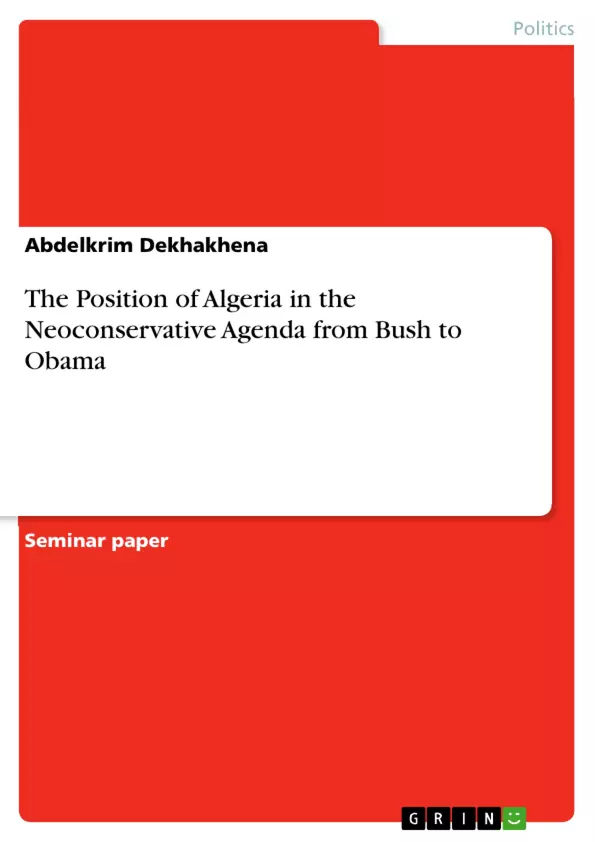The U.S.-Algerian relations have long been subject to fluctuation and uncertainty since Algeria’s independence. However, recently after a cabal of neoconservatives was swarmed into the Bush Administration there had been an increasing interest in the country. This paper looks into the rationale of the American unexpected shift of interest towards Algeria in the dawn of the 21st century. It situates the place of this so long neglected country in the design of American neoconservative foreign policy agenda following the 09/11 attacks. The terrorist attacks on the United States and the rise of the neoconservative cabal, undoubtedly changed international relations in significant ways. Those events pushed the United States to alter its policies toward a number of regimes by building a broad “coalition against terrorism”. Washington reached out to countries that until recently were considered hostile or at least not so friendly.
In foreign policy, the neoconservatives do differ from other American politicians and pundits in their intense commitment to the projection of American military and economic power. The agenda of the neoconservatives was based on stretching American influence to protect its vital economic interests by establishing friendly relations with countries that correspond to America’s perspectives.
Although it never constituted a priority for the United States in the past, in recent years Algeria has increasingly become a region of great interest to policymakers in Washington. However, an outstanding interest in the country came with the rise of neoconservatives to power in the Bush Administration. This new significance attached to the country derives from a number of considerations that fall into two broad sets: political and economic energy interests, and military, strategic and security interests. The first are linked to America’s energy needs from oil and gas; and interest in a potentially important market for U.S. businesses, especially since competition has heightened with China in Africa. The second motives are relatively connected to Washington’s reshuffle of strategic and security policies. These increased the need for new ways of managing issues related to security, terrorism and democratization.
Inhaltsverzeichnis (Table of Contents)
- Introduction
- US-Algerian Relations in Retrospect
Zielsetzung und Themenschwerpunkte (Objectives and Key Themes)
This paper analyzes the reasons behind the shift in American interest towards Algeria in the early 21st century, specifically during the Bush administration. It examines Algeria's role within the neoconservative foreign policy agenda following the 9/11 attacks, focusing on how this previously neglected country became a strategic interest for the United States.
- The impact of the 9/11 attacks on US foreign policy
- The rise of neoconservatism in the Bush administration
- Algeria's strategic significance in the context of energy needs, economic interests, and security concerns
- Historical tensions and complexities in US-Algerian relations
- The influence of the Cold War on US-Algerian relations
Zusammenfassung der Kapitel (Chapter Summaries)
- Introduction: This section introduces the paper's focus on the changing US-Algerian relations in the wake of 9/11 and the rise of neoconservatism. It highlights the shift in US policy towards building a broader "coalition against terrorism" and engaging with previously hostile or less friendly countries. The paper argues that the neoconservative agenda, driven by strategic calculations to protect American interests, was marketed under the banner of promoting democracy and establishing friendly relations worldwide.
- US-Algerian Relations in Retrospect: This chapter examines the historical trajectory of US-Algerian relations, characterized by suspicion, hostility, and shifting alliances. It highlights the impact of the Cold War and the Algerian War of Independence on their relationship, along with key events that shaped their interactions, such as the 1967 war with Israel, the Vietnam War, and the release of US hostages from Iran in 1981. The chapter also discusses the role of energy needs, economic interests, and changing political dynamics in shaping the relationship over time.
Schlüsselwörter (Keywords)
The main keywords and focus topics of this text are: international relations, Algeria, United States, neoconservatives, foreign policy, energy interests, economic interests, security concerns, terrorism, Cold War, post-colonialism, strategic alliances, and historical relations.
Frequently Asked Questions
Why did US interest in Algeria shift in the early 21st century?
The shift was primarily driven by the 9/11 attacks and the rise of neoconservatives in the Bush administration, who sought to build a broad "coalition against terrorism."
What are the main US interests in Algeria according to the paper?
Interests fall into two categories: energy/economic (oil and gas needs, African market competition with China) and military/security (anti-terrorism and regional stability).
How were US-Algerian relations characterized historically?
Relations were long subject to fluctuation, suspicion, and hostility, influenced by the Cold War and Algeria's non-aligned stance after independence.
What role did neoconservative ideology play in this relationship?
Neoconservatives prioritized the projection of American military and economic power, establishing ties with strategic countries to protect vital US interests.
What historical events shaped the retrospective relationship?
Key events include the Algerian War of Independence, the 1967 Arab-Israeli war, the Vietnam War, and Algeria's role in the 1981 release of US hostages from Iran.
How did the neoconservative agenda market its foreign policy?
The agenda was often marketed under the banner of promoting democracy, though it was largely driven by strategic and economic calculations.
- Citar trabajo
- Abdelkrim Dekhakhena (Autor), 2012, The Position of Algeria in the Neoconservative Agenda from Bush to Obama, Múnich, GRIN Verlag, https://www.grin.com/document/276380



